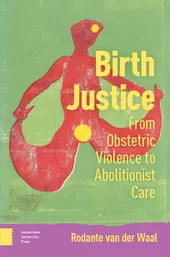
Reproductieve rechtvaardigheid
Reproductieve rechtvaardigheid is een Zwart feministische term die wereldwijd steeds meer aandacht krijgt binnen zowel activisme als onderzoek. In Nederland is de term nog relatief onbekend. Wereldwijd worden we op dit moment geconfronteerd met reproductief onrecht: met de criminalisering van abortus, hogere moeder- en kind sterftecijfers voor mensen van kleur, en toenemend bewijs voor de structurele aard van obstetrisch geweld en racisme. De investeringen die we doen in vruchtbaarheid en voortplanting zijn ongelijk, met name in (post)koloniale contexten. De term reproductieve rechtvaardigheid probeert al deze verschillende facetten van onrecht in relatie tot vruchtbaarheid samen te nemen. Tijdens deze avond zal een divers panel van academici en verloskundigen het concept van reproductieve rechtvaardigheid introduceren en bespreken, wat er op het spel staat en wat we hiervan kunnen leren.
Please note: this event is in Dutch
Reproductieve rechtvaardigheid betreft de strijd voor het recht: 1) om een kind te krijgen; 2) om geen kind te krijgen; en 3) om kinderen te krijgen in veilige en waardige omgevingen. Samen bespreken we deze drie pijlers in relatie tot obstetrisch geweld, obstetrisch racisme, reproductieve technologieën, reproductie in koloniale contexten, specifiek Palestina, en abortus. Door de drie pijlers met elkaar te verbinden, reflecteren we op hoe deze specifieke vormen van onderdrukking samen een staat van reproductieve onrechtvaardigheid vormen.
Over de sprekers
Rodante van der Waal is vroedvrouw in Amsterdam en doet promotieonderzoek in de filosofie naar reproductieve rechtvaardigheid en obstetrisch geweld. Ze publiceerde het boek Birth Justice: From Obstetric Violence to Abolitionist Care dit jaar bij Amsterdam University Press. In 2025 verschijnt haar eerste dichtbundel bij Nijgh & Van Ditmar
Bahareh Goodarzi is verloskundige, docent aan de Academie Verloskunde Amsterdam/Inholland en assistant professor bij de afdeling Verloskundige Wetenschap Amsterdam UMC. Goodarzi doet onderzoek naar discriminatie en rechtvaardigheid in de geboortezorg. Ze schreef dit jaar samen met Daan Borrel een boek over de ongelijkwaardigheid in de geboortezorg in Nederland: Baren buiten de box.
Siggie Vertommen werkt als gender onderzoekster en docente aan de Universiteit van Amsterdam en de Universiteit Gent. Ze doet feministisch onderzoek naar de globale politiek rond (medisch begeleide) reproductie, van Israël/Palestina tot Georgië en België. Ze droomt luidop van feministische revoluties, en is lid van allerhande collectieven zoals de UGent Vrouwenstaking, Furia, Slow Science en Sophia.
Madyasa Vijber is werkzaam als caseload vroedvrouw in Rotterdam. Zij behaalde haar bachelor verloskunde aan de Verloskunde Academie Amsterdam en volgde een minor in ‘Politics of Maternity Care’ en ‘Empowering Midwifery Practices’ aan de Universiteit van Nottingham. In haar werk zijn zelfbeschikking, anti-racisme en radicale zorg belangrijke concepten en zij onderzoekt al gaandeweg hoe zorgend werk vormgegeven kan worden op een manier die duurzaam, wederkerig en medemenselijk is. Naast haar werk als verloskundige is zij oprichter van het Ujamaa collectief voor zwarte geboortewerkers, en onderdeel van Critical Midwifery Studies Collective, een internationaal collectief van verloskundigen, doula’s, activisten en academici, dat plaats maakt voor een kritische analyse van geboortezorg. Voor Madyasa ís geboortewerk activistisch, omdat geboorte geven niet los gezien kan worden van de politiek die dat proces zo sterk beïnvloedt.
Robin Goudsmit (moderator) is journalist bij Trouw. Haar werk verscheen ook in De Revisor en rekto:verso. In 2021 werd ze door Vlaams-Nederlands huis deBuren en het Brusselse podium Pilar benoemd tot Scherpsteller, een positie voor een veelbelovende jonge denker.

:rgb(-15)

:rgb(-25)

:rgb(8)
